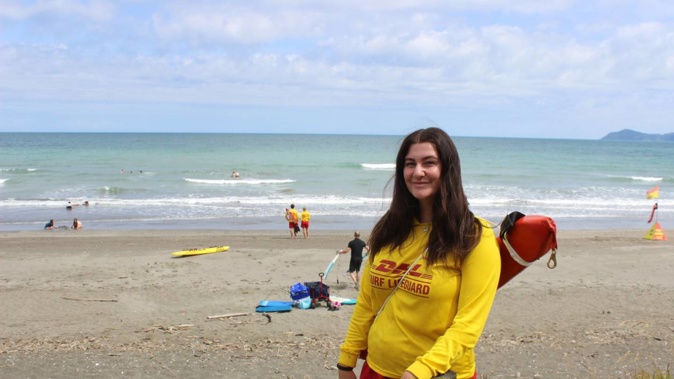
With the end of the season approaching quickly, experienced lifeguard Ally Jones looks back on her last six weeks at Paekākāriki Beach.
After what she deemed a busy season with good weather, she is happy to report very few incidents.
“I much prefer quiet seasons because it means everyone is having a safe time at the beach.”
There are always three lifeguards on duty during the week, and on weekends there can be as many as 20 patrolling the beach.
The Paekākāriki club team’s goal is to prevent incidents.
They want to ensure that swimmers are educated, talk to lifeguards about concerns, and recommend visiting the Safe Swim website, which gives detailed reports about many of the different New Zealand beaches.
Another method the lifeguards use as prevention is checking on swimmers who have been in the water for quite a long time.
Jones also wants people to always swim between the flags, and only swim when lifeguards are present between 11am and 6pm.
However, even when taking all the precautions, accidents do happen.
Jones recalls one incident of a one-armed boater whose small boat tipped over in heavy wind.
- Lifeguards urge safe swimming
- Summers under threat: Tourism pushing lifeguards to the limit
- Surf lifesaving club in danger of closure if new building cannot be funded
Herself and other lifeguards had to rush out and pull him into their IRB (inflatable rescue boat), and drag his boat in too.
Luckily, the boat was not too far out in the ocean, but Jones warns other boaties to be careful.
“It was all good, no harm no foul.”
Currently there are no clubrooms after the building was demolished late last year, and they are operating out of a small number of shipping containers donated by a range of people, including Jones’ father Peter, who donated the main container the lifeguards operate from.
Jones said adapting to having no clubrooms was difficult, but now they had a great setup with an open shipping container and a donated patrol tower looking right over the beach.
/cloudfront-ap-southeast-2.images.arcpublishing.com/nzme/A43V5ULVTBHUTMCL57BHU2O6L4.jpg)
A donated patrol tower and shipping container clubroom.
“We had to adapt to not having all the facilities that we had, like a proper first aid room.”
Fundraising is ongoing to build new clubrooms further back from the beach, so as to avoid coastal erosion.
Although the season may be coming to an end for many of the paid lifeguards, there will still be volunteer lifeguards on duty at Paekākāriki Beach until the start of March.
Jones has always loved the ocean, and grew up with a father who was also a member of the surf life saving community.
At age 11 she started getting involved in various clubs throughout the North Island, and today at 22 she has now been the head lifeguard at the Paekākāriki Surf Life Saving Club for the past two seasons.
When Jones was 15 years old, she participated in the 2016 Eastern Bay Energy Trust New Zealand Surf Life Saving Championships.
During this race, another competitor in front of her stopped, was upset, and took in water.
Jones stopped to assist, calling over the rescue team, who took the girl away in an IRB.
She said to this day, it is still one of the highlights of her career.
Jones is in her third and final year at Victoria University where she is studying towards an English major, but looks forward to summer when she can return to the beach.
She spends her holidays from university as a lifeguard six days a week, from 11am to 6am, where an average day involves safety forms, training, and of course keeping people safe in the ocean.
She is hoping to spend next summer at a busier beach, like Piha.
Take your Radio, Podcasts and Music with you









